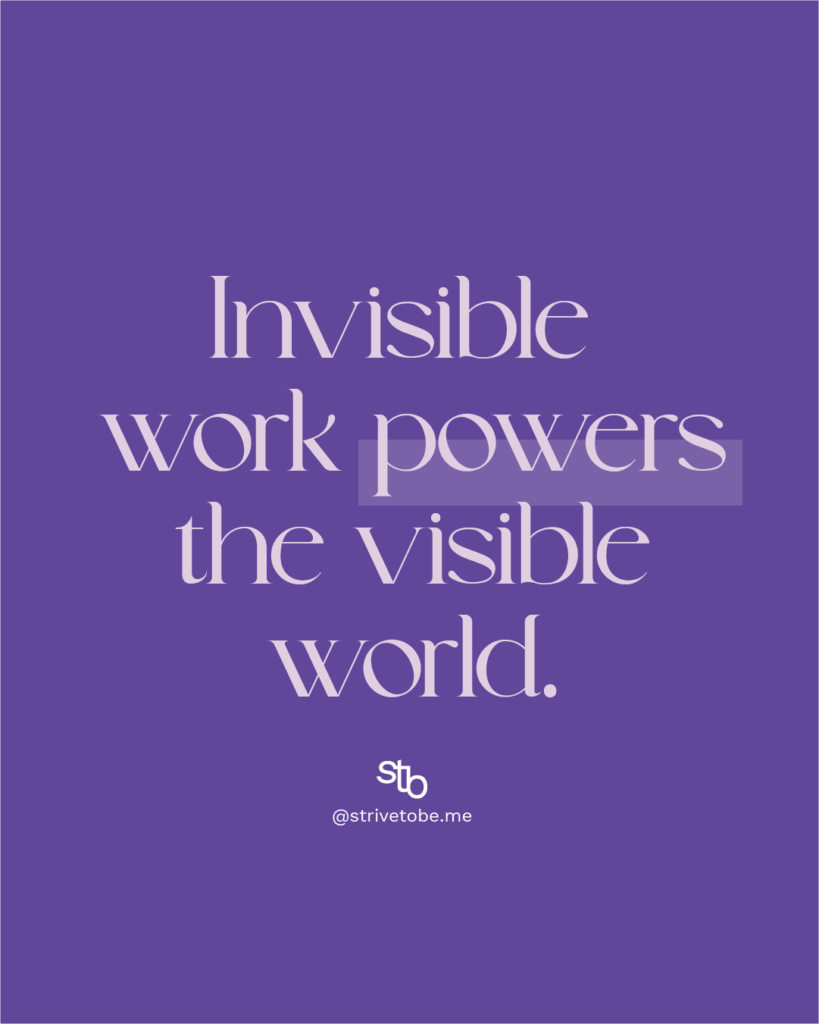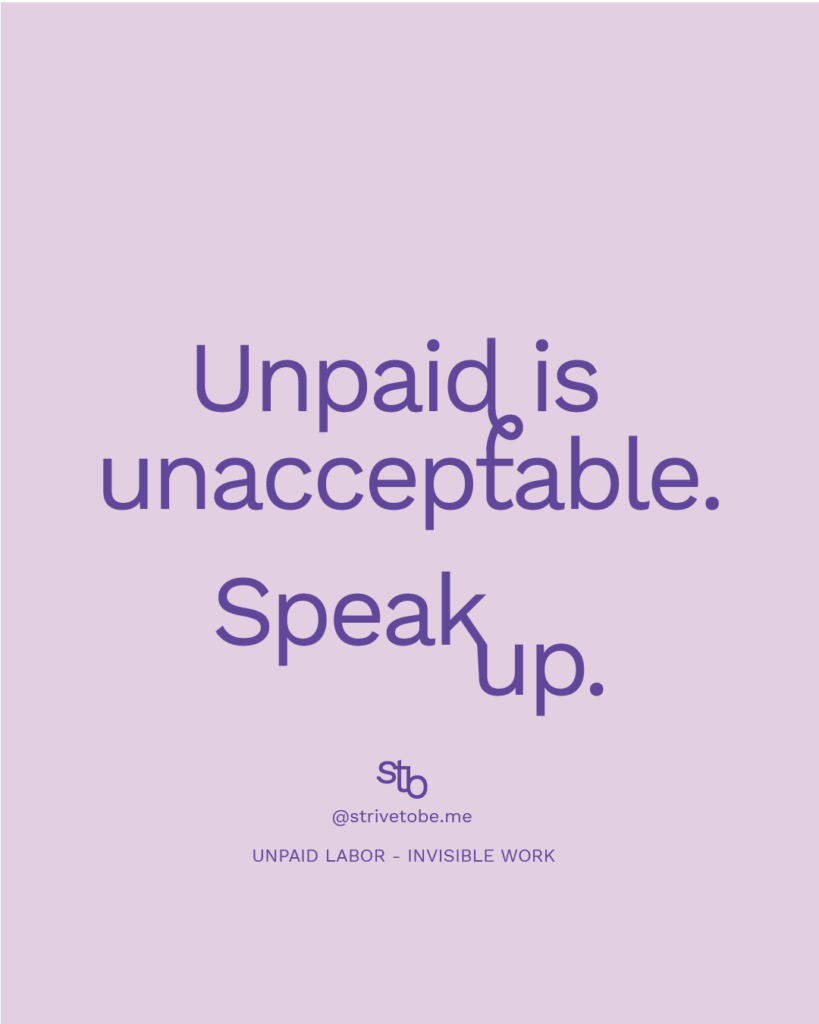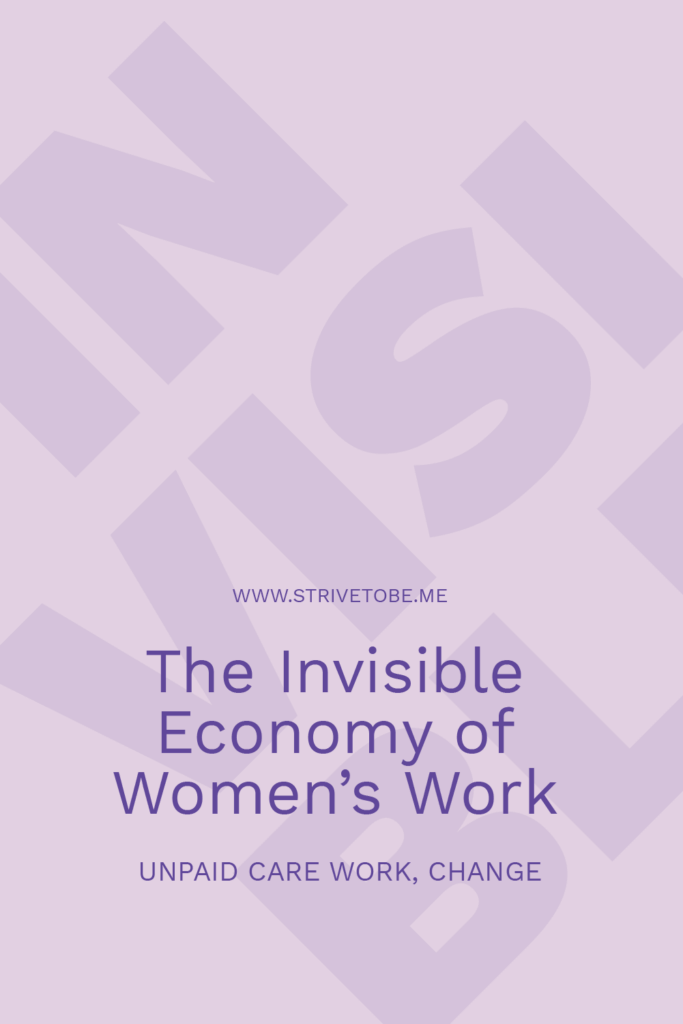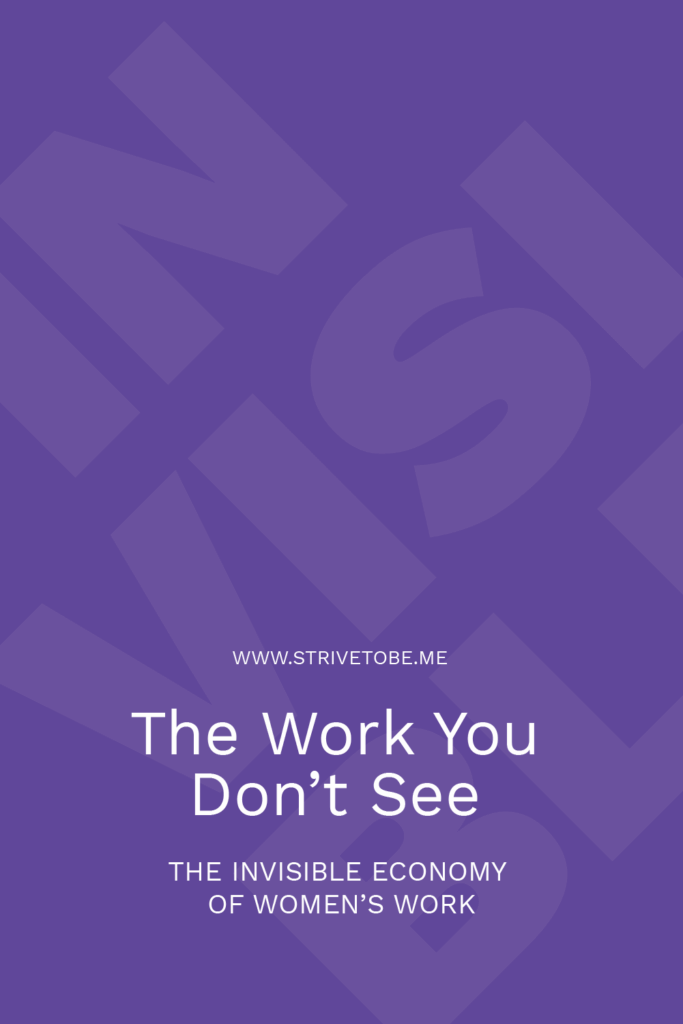The Work You Don’t See: The Invisible Economy of Women’s Work

Why Women Power the World Without Credit
We live in a world that often celebrates profit, power, and visibility, but ignores the labor that makes all of it possible. Women are the backbone of society, yet much of their work remains invisible, undervalued, and uncompensated. From emotional support to creative contributions, women are creating enormous value every single day, often without recognition.
It’s time to shine a light on the invisible economy of women’s work.
What Is the Invisible Economy?
The invisible economy refers to the work that is essential, yet unpaid or unrecognized. This includes:
- Household labor – cooking, cleaning, managing schedules
- Childcare and eldercare – the emotional and physical labor of caregiving
- Emotional labor – remembering birthdays, resolving conflicts, keeping social bonds
- Creative and community contributions – blogs, campaigns, mentorship, volunteer work
Globally, estimates suggest women perform up to 2.5 times more unpaid labor than men, contributing trillions of dollars worth of value annually. Yet this work is often invisible in GDP calculations, corporate reports, and even family recognition.
“Women do more than half of the world’s work, but earn only a fraction of the income.” – UN Women, 2023
The numbers are staggering
| Type of Work | Average Hours per Week (Women) | Average Hours per Week (Men) |
|---|---|---|
| Household chores | 14–18 hours | 6–8 hours |
| Childcare | 10–12 hours | 4–6 hours |
| Emotional labor | 7–10 hours | 2–4 hours |
Studies link this unseen labor to burnout, chronic stress, and mental health challenges. A 2022 study in The Lancet highlighted that women who carry disproportionate household and emotional workloads experience higher cortisol levels and are at greater risk of heart disease and depression.
The “invisible economy” isn’t just about fairness—it’s about women’s health, longevity, and freedom to thrive.
Why Society Undervalues Women’s Work
The invisible economy persists because society often deems “care” as soft, natural, or secondary. Cultural expectations push women into caregiving roles while rewarding men for visible, measurable output like promotions or profit.
Consider this: women are more likely to mentor, organize, and manage relationships at work—but are rarely promoted for these skills. In families, women are expected to remember birthdays, plan meals, and coordinate schedules, yet it’s seen as “just what women do.” Undervaluing care and emotional work is a pillar of patriarchal systems – be aware of it & find out how patriarchy is still shaping women to this day.
“The undervaluing of care work isn’t a bug; it’s a feature of patriarchal systems.” – Arlie Hochschild, sociologist
How Women Can Reclaim Value
Empowered women can reclaim credit and influence by making invisible work visible. Here’s how:
- Track and articulate your contributions
- Keep a weekly log of emotional, administrative, and creative work
- Use it to negotiate pay, recognition, or shared responsibilities
- Redefine success metrics
- Ask for promotions or recognition based on impact, not just output
- Highlight mentorship, retention, and relationship-building as essential skills
- Monetize invisible labor
- Turn hobbies, mentorship, or community contributions into paid opportunities
- Platforms like Substack, Patreon, or workshops can make emotional and creative labor profitable
- Leverage community support
- Collaborate with other women to amplify contributions
- Share tools, checklists, and frameworks to make hidden work visible
To initiate sustainable change, it is crucial to acknowledge and address the existence of invisible work. First, we must raise awareness about invisible work and its impact on individuals and communities. [Psychology Today]
Take Action: Make the Invisible, Visible
Women are already driving society forward—but we must claim recognition, resources, and health in the process.
- Start by tracking your own invisible work this week. What are you doing that no one notices?
- Challenge systems at work & home that reward visibility over impact.
- Use your platform—blog, social media, or networks—to highlight unpaid contributions and make them part of the conversation.
Invisible work is powerful.
Recognized work is transformative.
When women take credit for what they already do, it’s not just a win for themselves—it’s a blueprint for the next generation, showing girls and young women that labor, care, and leadership all have measurable value. We can make the invisible economy of women’s work visible and initiate change.
Secret Longevity Benefits of Claiming Your Invisible Work
| Hidden Work You Do | Health / Longevity Benefit | How Claiming It Helps |
|---|---|---|
| Emotional labor (resolving conflicts, supporting others) | Lower chronic stress if recognized and shared | Writing it down, delegating, or discussing it reduces cortisol and protects heart health |
| Household & administrative tasks | Prevents mental burnout if workload is balanced | Negotiating shared responsibilities allows more recovery time, supporting long-term brain and heart health |
| Mentorship & career support | Enhances cognitive resilience | By claiming credit, your contributions are valued, increasing self-esteem and psychological well-being |
| Creative & community work | Increases purpose and life satisfaction | Monetizing or sharing impact boosts dopamine, supports motivation, and promotes longer, healthier aging |
| Health & wellness advocacy for family | Reduces guilt-related stress | Claiming these efforts validates your role and reduces anxiety, which lowers inflammation markers |


5 Steps to Turn Your Invisible Work Into Recognized Power (and Health Gains)
1. Audit Your Contributions
- What to do: Write down all the invisible tasks you handle—emotional labor, planning, mentoring, household coordination, advocacy.
- Why it matters: Visibility is power. Seeing your efforts in black and white shows where energy is spent and where boundaries need to be drawn.
2. Claim Your Value—Verbally and Strategically
- What to do: In professional and personal settings, communicate what you’ve done and how it contributed to outcomes.
- Example: Instead of silently managing the office workflow, say: “I coordinated these projects and ensured deadlines were met.”
- Health impact: Recognition reduces chronic stress and reinforces psychological resilience.
3. Negotiate and Share the Load
- What to do: Explicitly discuss which tasks can be delegated, rotated, or shared, particularly in relationships or households.
- Why it matters: Longevity research shows that chronic stress and mental load directly affect heart health and cortisol levels. Sharing work = longer, healthier life.
- Pro tip: Use facts, not guilt: show that shared responsibilities benefit everyone’s well-being.
4. Leverage Invisible Work for Growth
- What to do: Transform invisible labor into skills and experience that advance your career, network, or personal projects.
- Example: Mentoring colleagues can be framed as leadership experience; organizing community events can be framed as project management.
- Health impact: Purpose, mastery, and agency all correlate with lower stress and improved longevity markers.
5. Set Boundaries as a Longevity Strategy
- What to do: Decide what you will—and won’t—take on. Respect your energy and your health first.
- How to implement: Schedule recovery time, say no to non-essential tasks, and protect time for movement, nutrition, and sleep.
- Bottom line: Boundaries aren’t selfish—they’re survival. Long-term wellness depends on prioritizing your body, brain, and emotional health.
Invisible work doesn’t have to be invisible in impact—or health consequences. By claiming, communicating, and leveraging your labor, women not only increase fairness—they boost longevity, protect their health, and gain real empowerment.


References:
What ‘Invisible Work’ Looks Like in the 21st Century
You might also like:
How Patriarchy still Shapes Women & How we Can Redesign It
Female Exhaustion: How Patriarchy Profits from Your Fatigue
Female empowerment? Glad you asked!
How to sort the chaos in your head
Stop saying yes to shit you hate





